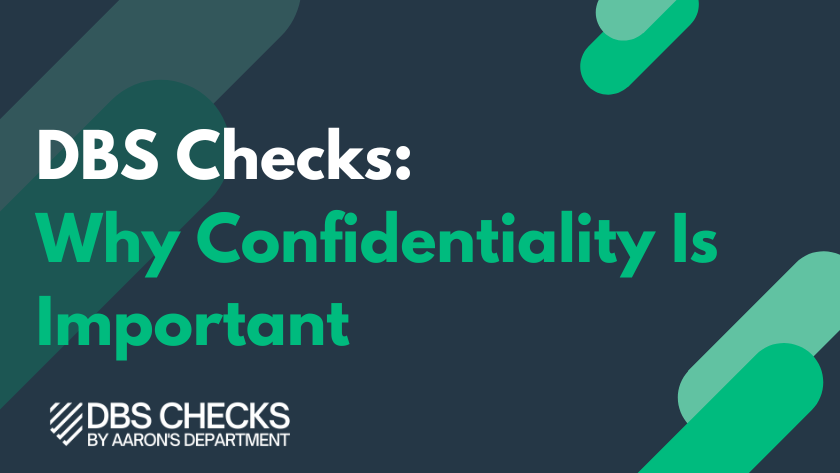Why Confidentiality is important in DBS checks
Preserving confidentiality is of the utmost importance when handling Disclosure and Barring Service (DBS) data. All organisations must adhere to data protection laws, and when it relates to information concerning criminal records, this obligation becomes even more imperative.
In this guide, we will delve into the reasons why confidentiality is important for DBS data and how organisations should manage it and how we play our part, here at Aaron’s Department, to make sure your DBS Check data is kept secure.


Why Confidentiality Is Important
- Encouraging Trust: Confidentiality plays an important role in fostering trust between organisations and their employees. When an organisation deals with DBS data, it frequently involves handling individuals’ sensitive information. The knowledge that this information will be handled responsibly encourages confidence in the organisation and its processes.
- Legal Requirement: Confidentiality is not merely a matter of trust; it is also a legal obligation. Those responsible for data must adhere to data protection regulations as set out by the General Data Protection Regulation (GDPR) which are effective across Europe.
The GDPR encompasses six data protection principles:
- Using data fairly and lawfully.
- Collecting data for specific, legitimate purposes.
- Using data that is relevant and limited to what is necessary.
- Maintaining data accuracy and ensuring updates when necessary.
- Retaining data only for the necessary duration.
- Processing data securely.
Failure to comply with the GDPR can result in substantial fines. Misuse of DBS data can be costly and detrimental to organisations and individuals alike.


Why Confidentiality Is Important – The DBS Code of Practice:
In addition to data protection laws, specific regulations govern the use of DBS data. The DBS Code of Practice, established under the Police Act 1997, ensures the fair and appropriate utilisation of criminal record information. Any entity receiving Standard or Enhanced disclosure information must adhere to this code.
Key aspects of the DBS Code of Practice include:
- Requiring all registered bodies to have written policies for secure handling of DBS information.
- Ensuring that entities or individuals on whose behalf applications are countersigned also maintain written policies.
- Emphasising compliance with the DBS code of practice and data protection laws.
- Securely storing DBS data.
- Authorising DBS data access only for individuals performing their job duties.
- Using DBS data solely for the intended purpose.
- Keeping DBS data for a limited duration, typically up to six months.
- Securely disposing of DBS data after the retention period lapses.
Organisations regulated by bodies like the CQC and Ofsted may have additional requirements related to personal data handling. It may be worth checking with your regulatory body to see if there are any extra requirements.
Why Confidentiality Is Important – Criminal Records and Recruitment:
The DBS Code of Practice also seeks to protect applicants with criminal records from discrimination based on irrelevant convictions.
Key provisions include:
- Maintaining a written policy on the recruitment of ex-offenders, available to applicants upon request.
- Informing all applicants in advance about the need for a DBS check.
- Notifying potential applicants about the potential impact of a criminal record on the recruitment process and decisions.
- Discussing disclosure content with the applicant before withdrawing an employment offer.
Why Confidentiality Is Important – Are DBS Checks Confidential?
Employers should prioritise confidentiality because it serves two important purposes: building trust among employees and complying with legal obligations. Here in the UK, employers are required to adhere to stringent data protection rules known as the DPA, now regulated by GDPR (General Data Protection Regulation). These rules outline specific principles:
- Data should only be collected for clear, explicit, and lawful reasons.
- Data must be used fairly and within the bounds of the law.
- It should be used only for relevant and necessary purposes, avoiding excessive data collection.
- Data should not be retained longer than needed.
- Adequate security measures must be in place to protect the data during processing.
Why Confidentiality Is Important – How Aaron’s Department Keeps Your Data Safe.
Here at Aaron’s Department, our top priority is confidentiality -keeping your data safe and secure. You can find our Data Protection Policy and our Privacy Policy linked below if you’d like to see for yourself:
We follow GDPR guidelines and handle our data accordingly. If you would like to discuss DBS Checks and confidentiality with us further, you can call us on 0113 877 0171, and we’ll be happy to answer any questions.


Why Confidentiality Is Important – Conclusion
Confidentiality and maintaining the confidentiality of DBS data is vital for trust, legal adherence, and fairness. It ensures individuals trust organisations with their sensitive information and comply with the law. The DBS Code of Practice provides guidance, protecting applicants with criminal records from unfair treatment during the hiring process. Here at Aaron’s Department, we adhere to strict data protection rules to safeguard confidentiality. In today’s data-focused world, DBS data confidentiality is both a moral and legal imperative.
If you are looking for a company to undertake DBS Checks with, who understands why confidentiality is important, look no further than Aaron’s Department, our experience with DBS Checks and the confidentiality surrounding them is unbeatable and our transparent DBS price points make us an easy choice for your DBS Checks.
Register today, for free or book one of our free demonstrations.
.
About The Author


Kellie Dawson
Kellie is our in-house legal expert when it comes to DBS checks. With a background in the legal sector, she has become a recognised authority in this area.
